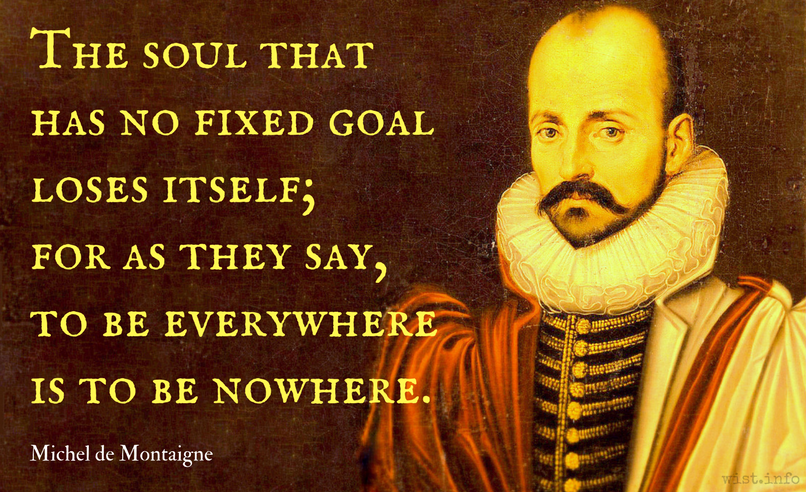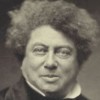If well thou hast begun, go on fore-right
It is the end that crowns us, not the fight.
Quotations about:
target
Note not all quotations have been tagged, so Search may find additional quotes on this topic.
Focusing your life solely on making a buck shows a certain poverty of ambition. It asks too little of yourself. You need to take up the challenges that we face as a nation and make them your own. Not because you have a debt to those who helped you get here, although you do have that debt. Not because you have an obligation to those who are less fortunate than you, although I do think you do have that obligation. It’s primarily because you have an obligation to yourself. Because individual salvation has always depended on collective salvation. Because it’s only when you hitch your wagon to something larger than yourself that you realize your true potential.
Barack Obama (b. 1961) American politician, US President (2009-2017)
Speech (2005-06-04), Commencement, Knox College, Galesburg, Illinois
(Source)
The house of the bard Theodorus burned down!
What an insult, O Muses, to you!
The gods have done wrong:
For the credit of song
The bard — should have burned with it, too.
[Pierios vatis Theodori flamma penates
Abstulit. Hoc Musis et tibi, Phoebe, placet?
O scelus, o magnum facinus crimenque deorum,
Non arsit pariter quod domus et dominus!]Martial (AD c.39-c.103) Spanish Roman poet, satirist, epigrammatist [Marcus Valerius Martialis]
Epigrams [Epigrammata], Book 11, epigram 93 (11.93) (AD 96) [tr. Nixon (1911), “An Oversight”]
(Source)
"On Theodorus, a Bad Poet." (Source (Latin)). Alternate translations:
Flames Theodore's Pierian roofs did seize.
Can this Apollo, this the Muses, please?
O oversight of the gods! O dire disaster!
To burn the harmless house, and spare the master!
[tr. Killigrew (1695)]
Poor poet Dogrel's house consum'd by fire?
Is the muse pleas'd? or father of the lyre?
O cruel Fate! what injury you do,
To burn the house! and not the master too!
[tr. Hay (1755), ep. 94]
The poor poet Theodore's goods, in a flame,
Gave you, wicked Muses, and Phebus full glee.
Ye sov'rain disposers, what sin and what shame,
That holder and house so disparted should be!
[tr. Elphinston (1782), Book 3, ep. 49]
Fitzgerald's house hath been on fire -- the Nine
All smiling saw that pleasant bonfire shine.
Yet -- cruel Gods! Oh! ill-contrived disaster!
The house is burnt -- the house -- without the Master!
[tr. Byron (c. 1820); referencing Irish/British poet, William Thomas Fitzgerald (1759-1829)]
The flames have destroyed the Pierian dwelling of the bard Theodorus. Is this agreeable to you, you muses, and you, Phoebus? Oh shame, oh great wrong and scandal of the gods, that house and householder were not burned together!
[tr. Bohn's Classical (1859)]
The poetic abode of bard Theodorus a fire has destroyed. Does this please you, ye Muses, and you, Phoebus? Oh, what guilt, oh, what a huge crime and scandal of the gods is here! House and master did! House and master did not burn together!
[tr. Ker (1919)]
A poet’s house consumed by fire!
Phoebus and ye, the heavenly choir,
What vengeance will ye now require
For such a fell disaster?
How foul a deed, how black a shame!
Can men acquit the gods of blame
When they delivered to the flame
The house and not its master?
[tr. Pott & Wright (1921), "The Gods' Mistake"]
Where were ye, Muses, when in angry flame
Sank Pye's Pierian dwelling? Phoebus, shame!
Oh cruel sin, o scandal to the sky,
To bake the Pye-dish and forget the Pye!
[tr. Francis & Tatum (1924), ep. 634; referring to Henry James Pye (1745-1813), Poet Laureate of the UK]
Not a single trace remains
Of poet Theodorus' home.
Everything completely burned,
Every last poetic tome!
You Muses and Apollo too,
Now are you fully satisfied?
O monstrous shame that when it burned
The poet was not trapped inside!
[tr. Marcellino (1968)]
Flames have gutted th' abode Pierian
Of the wide-renowned poet Theodorus.
Didst thou permit this sacrilege, Apollo?
Where were ye, Muse's Chorus?
Ay me, I fondly sight, that was a crime,
A wicked deed, a miserable disaster.
Ye gods are much to blame: ye burnt the house
But failed to singe its master!
[tr. Wender (1980)]
Ted's studio burnt down, with all his poems.
Have the Muses hung their heads?
You bet, for it was criminal neglect
not also to have sautéed Ted.
[tr. Matthews (1992)]
Fire has consumed the Pierian home of poet Theodoras. Does this please the Muses and you, Phoebus? Oh crime, oh monstrous villainy and reproach to heaven! -- that house and householder did not perish together.
[tr. Shackleton Bailey (1993)]
Flames took the home of poet Theodorus.
Are the Muses and Phoebus pleased with this disaster?
What a great crime and insult to the gods
not to have burned together home and master!
[tr. McLean (2014)]
LEAR: Come not between the dragon and his wrath.
William Shakespeare (1564-1616) English dramatist and poet
King Lear, Act 1, sc. 1, l. 136 (1.1.136) (1606)
(Source)
HELENA: All’s well that ends well. Still the fine’s the crown.
Whate’er the course, the end is the renown.William Shakespeare (1564-1616) English dramatist and poet
All’s Well That Ends Well, Act 4, sc. 4, l. 39ff (4.4.39-40) (1602?)
(Source)
While then the worst man is he who displays vice both in his own affairs and in his dealings with his friends, the best man is not he who displays virtue in his own affairs merely, but he who displays virtue towards others; for this is the hard thing to do.
[κάκιστος μὲν οὖν ὁ καὶ πρὸς αὑτὸν καὶ πρὸς τοὺς φίλους χρώμενος τῇ μοχθηρίᾳ, ἄριστος δ᾽ οὐχ ὁ πρὸς αὑτὸν τῇ ἀρετῇ ἀλλὰ πρὸς ἕτερον: τοῦτο γὰρ ἔργον χαλεπόν.]
Aristotle (384-322 BC) Greek philosopher
Nicomachean Ethics [Ἠθικὰ Νικομάχεια], Book 5, ch. 1 (5.1.18) / 1130a.5-8 (c. 325 BC) [tr. Peters (1893)]
(Source)
(Source (Greek)). Alternate translations:
Now he is the basest of men who practises vice not only in his own person, but towards his friends also; but he the best who practises virtue not merely in his own person but towards his neighbour, for this is a matter of some difficulty.
tr. Chase (1847), ch. 2]
Worst of men is he whose wickedness affects not himself alone but his fellow with him; best of men is he whose virtue affects not himself alone but his fellow with him; for such a one has in all sooth a hard task.
[tr. Williams (1869)]
As then the worst of men is he who exhibits his depravity both in his own life and in relation to his friends, the best of men is he who exhibits his virtue not in his own life only but in relation to others; for this is a difficult task.
[tr. Welldon (1892)]
Now the worst man is he who exercises his wickedness both towards himself and towards his friends, and the best man is not he who exercises his virtue towards himself but he who exercises it towards another; for this is a difficult task.
[tr. Ross (1908)]
As then the worst man is he who practises vice towards his friends as well as in regard to himself, so the best is not he who practises virtue in regard to himself but he who practises it towards others; for that is a difficult task.
[tr. Rackham (1934)]
The worst sort of person, then, is the one who uses his depravity both in relation to himself and in relation to his friends, whereas the best sort is not the one who uses his virtue in relationship to himself but the one who uses it in relation to another person, since that is difficult work.
[tr. Reeve (1948)]
The worst man, then, is the one whose evil habit affects both himself and his friends, while the best man is one whose virtue is directed not to himself, but to others, for this is a difficult task.
[tr. Apostle (1975)]
So the worst person is the one who exercises his wickedness towards both himself and his friends, and the best is not the one who exercises his virtue towards himself but the one who exercises it towards another; because this is a difficult task.
[tr. Thomson/Tredennick (1976)]
So the worst person is the one who exercises wickedness in relation to himself and in relation to his friends, and the best is not he who exercises his virtue in relation to himself but the one who exercises it in relation to others, since this is a difficult thing to do.
[tr. Crisp (2000)]
Worst, then, is he who treats both himself and his friends in a corrupt way, but best is he who makes use of virtue not in relation to himself but in relation to another. For this is a difficult task.
[tr. Bartlett/Collins (2011)]
So you pretend to fear you may be hit
By pointed epigrams, the shafts of wit?
To seem a worthy foeman you aspire,
How vain alike the fear and the desire!
Against fiercest bulls the lion’s wrath may rise,
He scorns to war with puny butterflies.[Versus et breve vividumque carmen
in te ne faciam times, Ligurra,
et dignus cupis hoc metu videri.
sed frustra metuis cupisque frustra.
in tauros Libyci fremunt leones,
non sunt papilionibus molesti.]Martial (AD c.39-c.103) Spanish Roman poet, satirist, epigrammatist [Marcus Valerius Martialis]
Epigrams [Epigrammata], Book 12, epigram 61 (12.61.1-6) (AD 101) [tr. Pott & Wright (1921)]
(Source)
"To Ligurra". (Source (Latin)). Alternate translations:
You dread my verse, and sting of wit,
Which put you in a shaking fit:
Would seem of rank to entertain
Such fears: your fears and hopes are vain.
'Tis at the bull that lions fly,
While rats run unregarded by.
[tr. Hay (1755)]
Lest a little living song
Make thy fame, Ligurra, long;
Thou would'st have thy terror seen:
Vain thy wish as fear, I ween.
At the bulls the lions rise,
Never rush on butterflies.
[tr. Elphinston (1782), Book 3, ep. 31]
You are afraid, Ligurra, lest I should compose verses on you, some short and pungent epigram, and you wish to be thought a proper object of such rear. But vain is your fear. and vain your desire! Libyan lions rush upon bulls; they do not hurt butterflies.
[tr. Bohn's Classical (1859)]
You fear, Ligurra -- above all, you long --
That I should smite you with a singing song,
This dreadful honour you both fear and hope:
Both quite in vain: you fall below my scope.
The Libyan lion tears the roaring bull,
He does not harm the midge along the pool.
[tr. Stevenson (1884)]
You are afraid, Ligurra, I should write verses on you, and some short and lively poem, and you long to be thought a man that justifies such fear. But vain is your fear, and your longing is vain. Against bulls Libyan lions rage, they are not hostile to butterflies.
[tr. Ker (1919)]
You say you're scared I'm going to aim
A lampoon at you, something brief
And lurid, and half proudly claim
You're a marked man. Wishful belief!
Misapprehended apprehension!
African lions pay attention
To bulls, they don't hunt butterflies.
[tr. Michie (1972)]
Ligurra's fearful I'll contrive
Some pungent piece, some sprightly ditty,
And longs to be considered worth it.
Longings baseless! Baseless fears!
The Libyan lion paws the Libyan bull
But does not bat the butterfly.
[tr. Whigham (1987)]
You are afraid, Ligurra, of my writing verses against you, a brief, lively poem, and you long to seem worthy of such an apprehension. But idle is your fear and idle your desire. Libyan lions roar at bulls, they do not trouble butterflies.
[tr. Shackleton Bailey (1993)]
Ah Ligurra, you’re quite afraid that I might write
About you. Some nasty, pithy, diamond-shard of spite
As is my wont. In fact, you quite like the idea.
Well, don’t get your hopes up I’ll gratify that fear.
I may be beastly but I claw with discretion,
No stepping on insects, flattered to be flattened.
[tr. Ynys-Mon (2007)]
You fear I'll write a brief and lively poem
attacking you, Ligurra, and you yearn
to seem one who would merit such a fear.
Your wish is vain and so is your concern.
Lions of Libya roar at bulls; they leave
butterflies unmolested.
[tr. McLean (2014)]
Ligurra, you fear that I might compose
Verses against you, a brief, intense poem --
Oh how you long to seem worthy of this fear.
But you fear in vain, in vain you long.
The Libyan lions growl at bulls;
They do not pester butterflies.
[tr. @sentantiq (2018)]
See also Ben Jonson (1572-1637):
Sir Inigo doth fear it, as I hear,
And labors to seem worthy of that fear,
That I should write upon him some sharpe verse,
Able to eat into his bones, and pierce
Their marrow. Wretch! I quit thee of thy pain,
Thou'rt too ambitious, and dost fear in vain:
The Lybian lion hunts no butterflies,
He makes the camel and dull ass his prize.
A goal without a plan is just a wish.
Antoine de Saint-Exupéry (1900-1944) French writer, aviator
(Spurious)
The earliest version of this quote is found as an anonymous proverb in Joan Horbiak, 50 Ways to Lose Ten Pounds (1995). The earliest association with Saint-Exupéry dates to around 2007. It's sometimes further pinned down to The Little Prince (1943); it does not appear there, but that's Saint-Exupéry's best-known book.
M. says he would much rather be a coward than brave because people hurt you when you are brave …
E. M. Forster (1879-1970) English novelist, essayist, critic, librettist [Edward Morgan Forster]
Quoted by Alice Forster in a letter (1883)
(Source)
Ellipsis in original. Forster was 4 years old at the time. In P. N. Furbank, E. M. Forster: The growth of the novelist (1879-1914) (1977).
Mama exhorted her children at every opportunity to “jump at de sun.” We might not land on the sun, but at least we would get off the ground.
Zora Neale Hurston (1891-1960) American writer, folklorist, anthropologist
Dust Tracks on a Road, ch. 2 “My Folks” (1942)
(Source)
The soul that has no fixed goal loses itself; for as they say, to be everywhere is to be nowhere.
[L’âme qui n’a point de but établi, elle se perd: car comme on dit, c;est n’ètre en aucun lieu que d’être partout.]
Michel de Montaigne (1533-1592) French essayist
Essays, Book 1, ch. 8 “Of Idleness” (1580-88) [tr. Frame (1943)]
(Source)
Alt. trans.: "The soul that has no established aim loses itself, for, as it is said, 'He who lives everywhere, lives nowhere.'" [tr. Cotton (1877)]
Alt. trans.: "When the soul is without a definite aim, she gets lost; for, as they say, if you are everywhere you are nowhere." [tr. Screech (1987)]
The proverb referenced is Martial.
Now if of the things we do there is an end which we wish for its own sake […] then clearly this end would be good and the highest good. Will not knowledge of it, then, have a great influence on our way of life, and would we not as a consequence be more likely to attain the desired end, like archers who have a mark to aim at? If so, then we should try to grasp, in outline at least, what that end is and to which of the sciences or faculties it belongs.
[εἰ δή τι τέλος ἐστὶ τῶν πρακτῶν ὃ δι᾽ αὑτὸ βουλόμεθα, τἆλλα δὲ διὰ τοῦτο, καὶ μὴ πάντα δι᾽ ἕτερον αἱρούμεθα (πρόεισι γὰρ οὕτω γ᾽ εἰς ἄπειρον, ὥστ᾽ εἶναι κενὴν καὶ ματαίαν τὴν ὄρεξιν), δῆλον ὡς τοῦτ᾽ ἂν εἴη τἀγαθὸν καὶ τὸ ἄριστον. ἆρ᾽ οὖν καὶ πρὸς τὸν βίον ἡ γνῶσις αὐτοῦ μεγάλην ἔχει ῥοπήν, καὶ καθάπερ τοξόται σκοπὸν ἔχοντες μᾶλλον ἂν τυγχάνοιμεν τοῦ δέοντος; εἰ δ᾽ οὕτω, πειρατέον τύπῳ γε περιλαβεῖν αὐτὸ τί ποτ᾽ ἐστὶ καὶ τίνος τῶν ἐπιστημῶν ἢ δυνάμεων.]
Aristotle (384-322 BC) Greek philosopher
Nicomachean Ethics [Ἠθικὰ Νικομάχεια], Book 1, ch. 2 (1.2, 1094a.18ff) (c. 325 BC) [tr. Apostle (1975)]
(Source)
(Source (Greek)). Alternate translations:
Since then of all things which may be done there is some one End which we desire for its own sake, [...] this plainly must be the Chief Good, i.e. the best thing of all. Surely then, even with reference to actual life and conduct, the knowledge of it must have great weight; and like archers, with a mark in view, we shall be more likely to hit upon what is right: and if so, we ought to try to describe, in outline at least, what it is and of which of the sciences and faculties it is the End.
[tr. Chase (1847)]
If then there be some one end of all that we do, for which we wish for its own sake [...] it is evident that this end will be the chief and supreme good. Surely then a scientific knowledge of it will have a critical influence upon our lives, and will make us, like bowmen who have a mark at which to aim, all the more likely to hit upon that which is good. And if this be so, we must endeavour to describe it at least in outline, and to say of what science or of what art it is the province.
[tr. Williams (1869)]
If it is true that in the sphere of action there is an end which we wish for its own sake [...] it is clear this will be the good or the supreme good. Does it not follow then that the knowledge of this supreme good is of great importance for the conduct of life, and that, if we know it, we shall be like archers who have a mark at which to aim, we shall have a better chance of attaining what we want? But, if this is the case, we must endeavor to comprehend, at least in outline, its nature, and the science or faculty to which it belongs.
[tr. Welldon (1892), ch. 1]
If then in what we do there be some end which we wish for on its own account, [...] this evidently will be the good or the best of all things. And surely from a practical point of view it much concerns us to know this good; for then, like archers shooting at a definite mark, we shall be more likely to attain what we want. If this be so, we must try to indicate roughly what it is, and first of all to which of the arts or sciences it belongs.
[tr. Peters (1893)]
If, then, there is some end of the things we do, which we desire for its own sake [...] clearly this must be the good and the chief good. Will not the knowledge of it, then, have a great influence on life? Shall we not, like archers who have a mark to aim at, be more likely to hit upon what is right? If so, we must try, in outline at least, to determine what it is, and of which of the sciences or capacities it is the object.
[tr. Ross (1908)]
If therefore among the ends at which our actions aim there be one which we will for its own sake [...] it is clear that this one ultimate End must be the Good, and indeed the Supreme Good. Will not then a knowledge of this Supreme Good be also of great practical importance for the conduct of life? Will it not better enable us to attain our proper object, like archers having a target to aim at? If this be so, we ought to make an attempt to determine at all events in outline what exactly this Supreme Good is, and of which of the sciences or faculties it is the object.
[tr. Rackham (1934)]
If, then, there is some end of things doable in action that we wish for because of itself, [...] it is clear that this will be the good -- that is, the best good. Hence regarding our life as well, won't knowing the good have great influence and -- like archers with a target -- won't we be better able to hit what we should? If so, we should try to grasp in outline, at least, what the good is and to which of the sciences or capacities it properly belongs.
[tr. Reeve (1948)]
So if what is done has some end that we want for its own sake [...] then clearly this will be the good, indeed the chief good. surely, then, knowledge of the good must be very important for our lives? And if, like archers, we have a target, are we not more likely to hit the right mark? If so, we must try at least roughly to comprehend what it is and which science of faculty is concerned with it.
[tr. Crisp (2000)]
If, therefore, there is some end of our actions that we wish for on account of itself, [...] clearly this would be the good, that is, the best. And with a view to our life, then, is not the knowledge of this good of greater weight, and would we not, like archers in possession of a target, better hit on what is needed? If this is so, then one must try to grasp, in outline at least, whatever it is and to which of the sciences or capacities it belongs.
[tr. Bartlett/Collins (2011)]
You got to be careful if you don’t know where you’re going, because you might not get there.
This hitteth the naile on the hed.
John Heywood (1497?-1580?) English playwright and epigrammist
Proverbes, Part 2, ch. 11 (1546)
(Source)
We are more apt to persecute the unfortunates than the scoundrels; the scoundrels may retaliate.
Paul Eldridge (1888-1982) American educator, novelist, poet
Maxims for a Modern Man, #952 (1965)
(Source)
If you would hit the mark, you must aim a little above it.
Henry Wadsworth Longfellow (1807-1882) American poet
“Elegiac Verse,” In the Harbor (1882)
See Emerson.
It is better to suffer wrong than to do it, and happier to be sometimes cheated than not to trust.
Samuel Johnson (1709-1784) English writer, lexicographer, critic
The Rambler, #79 (18 Dec 1750)
(Source)
Look around the table. If you don’t see a sucker, get up, because you’re the sucker.
"Amarillo Slim" Preston (1928-2012) American gambler [Thomas Austin Preston, Jr.]
(Attributed)
Though he used the phrase, he did not take credit for it. More information here. Variants:
- "If after ten minutes at the poker table you do not know who the patsy is -- you are the patsy."
- "If you sit in on a poker game and don't see a sucker, get up. You're the sucker."
- "If you enter a poker game and you don't see a sucker, get up and leave -- you’re it."
The greatest danger for most of us is not that our aim is too high and we miss it, but that it is too low and we reach it.
The trouble with having an open mind, of course, is that people will insist on coming along and trying to put things in it.
We aim above the mark to hit the mark.
Ralph Waldo Emerson (1803-1882) American essayist, lecturer, poet
“Nature,” Essays: Second Series (1844)
(Source)






















